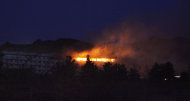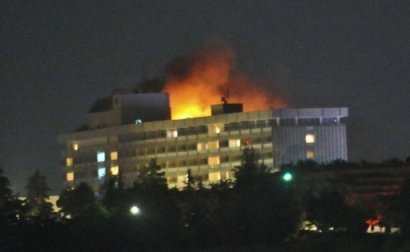On the surface, the Taliban’s audacious attack on the was a failure. After some six hours of fighting overnight, all eight assailants who managed to penetrate the hotel’s heavy security and who were wearing suicide vests and carrying automatic rifles and rocket propelled grenades were dead. The last three were killed as dawn was breaking on the hotel’s rooftop by two U.S. helicopter gunships firing machine guns, causing the insurgents’ explosive-laden vests to explode in balls of fire. There were no hostages. None of the 60 to 70 guests staying in the one-time luxury hotel were injured as most had locked themselves in their rooms. Guests at a wedding reception and diners in the restaurant and at a poolside barbecue escaped unharmed by clambering down the slope of the pine-tree studded hill on which the landmark hotel sits. Ten others—eight hotel staff and two policemen—died in the fighting.
But Taliban commanders who had planned and couldn’t have been more delighted. For them they had proven once again that insurgents can strike just about any time and anywhere against their chosen targets, exposing the fragility of Kabul’s security just days before Afghan security forces are scheduled to take responsibility for securing the city and several other towns and provinces around the country in the wake of President Obama’s announcement of the phased . “We have proved the Taliban can attack anywhere and any place,” Qari Talha, the underground insurgent commander for Taliban military operations inside Kabul told The Daily Beast by cell phone. “It embarrasses the U.S. and the Karzai puppet regime and makes the Taliban proud,” he added, referring to Afghan President Hamid Karzai’s government.
He says the attack was also meant to send a signal to the Afghan, Pakistani and U.S. officials who were scheduled to meet Wednesday at another venue in the capital that there will be no serious peace talks. The guerrillas also attacked the hotel, he says, because it was a den of iniquity in the eyes of the puritanical insurgency. “The hotel was a hell of evils,” says Talha. “We had warned such places where invaders get together or are staying that we have zero tolerance for such activities as vulgar wedding parties, drinking and dancing which are against Islam and Afghan culture.” “Such attacks will continue,” he vows.
Talha disclosed that the attack had been carefully planned over the past week and that the insurgents have an “operations room” inside the city that kept in contact with the gunmen in the hotel as the attack was unfolding. “We were in contact with the fedayeen until their final minutes,” he says, using the term that refers to suicide bombers. He also boasts of the insurgency’s intelligence gathering prowess. “We have sympathizers everywhere, even inside hotels,” Talha says. “They tell us about what each hotel looks like inside and its vulnerabilities.” He even goes so far as to say that “one or two” insurgents were actually guests in the hotel and had smuggled weapons inside the facility. “We had one or two guys staying in a hotel room for three days and were constantly updating the operational commander” on intelligence details,” Talha says. As soon as some of the gunmen penetrated the hotel, they were met by their collaborator inside who had a “supply of weapons.”
Ever since the Taliban announced the launching of its so-called spring offensive at the beginning of May, it has not been able to seize back any of the strategic areas it has lost to the U.S. “surge” forces over the past 18 months. But it has been able to conduct a number of headline-grabbing attacks inside cities such as the assault on the Inter-Continental. In May at least 10 suicide bombers and at least as many gunmen attacked the center of Kandahar city in the south targeting government security installations before they were all killed. The same month a suicide bomber killed six Afghan medical students inside the grounds of Kabul’s military hospital. Earlier this month insurgents wearing Afghan army uniforms hit a police station near Kabul’s presidential palace in an attack that left nine dead.
The U.S. military tends to dismiss such attacks saying they may win the insurgents a brief flash of publicity and nothing more. “That was only for one purpose: to create a [propaganda] victory and to put fear in the people’s minds,” Lt. Gen. David Rodriguez told The Daily Beast in an exclusive interview this month, referring to the Kandahar attack. “The real issue is how was [Kandahar City] two or three days later” adds the general who is the overall commander of military operations in Afghanistan. “It has returned to normal because the people were confident enough to go about their daily activities...and move forward.” American commanders will doubtlessly put a similar spin on the Inter-Con attack as life in Kabul will almost immediately get back to normal.
But such insurgent attacks do hit Afghan psyches and do raise again the paramount question in most people’s minds as U.S. and coalition forces prepare to gradually withdraw over the next three years: Can Afghan security forces protect us? A senior police officer at a station near the hotel has his doubts. “If U.S. forces had not intervened, the Afghan police would not have been able to manage this attack,” says the officer who does not want to be named because he is not authorized to speak to the press. “Our forces are still at an infant stage.” An Afghan businessman who also wanted to remain anonymous expressed similar reservations about security in the city and the country as U.S. forces plan to leave. “We thought the Kabul Inter-Con was a place to go for fun and a meal but I was wrong,” he says. “The Taliban seem capable of hitting any place. If we Afghans can’t protect symbols like a five-star hotel then why is the U.S. leaving Afghanistan?” he asks.
Saeed Ahmed, an Afghan living in Frankfurt, Germany, was having dinner with his wife, two teenage boys and two relatives when the fighting erupted at the hotel just before 10 p.m. Tuesday night. Panic-stricken, his family all somehow managed to climb over the wall surrounding the pool area and race down the hillside toward the highway. Ahmed, an engineer, says he had planned on renovating the family’s house in Kabul, and relocating his family there. After the attack, he says, his wife and kids who had been skeptical of Ahmed’s plan from the beginning asked him in unison: “Why did you bring us here to this dangerous place?” They all urged Ahmed to take them back to Germany. After last night’s ordeal, Ahmed says he is ready to agree to his family’s wishes. “I guess I’ll sell the house,” he told The Daily Beast. “I don’t believe we’ll have peace in Afghanistan anytime soon.”




















0 comments:
Post a Comment